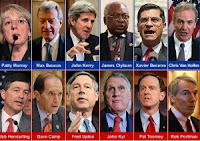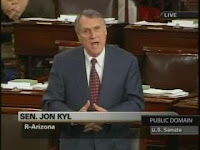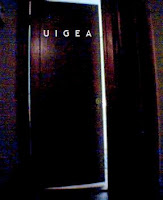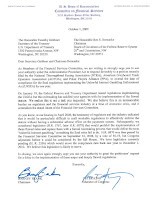Meanwhile... Reid-Kyl
And once again, talk about some sort of federal online poker bill sneaking its way through before the Congressional finish line has arisen. Turning into kind of a tradition, really.
You’ll recall how two years ago the month of December was dominated by talk of the “Reid Bill,” a.k.a. the Prohibition of Internet Gaming, Internet Poker Regulation and UIGEA Enforcement Act sponsored by senator Harry Reid (D-NV).
Looking back through my old posts from the end of 2010, I see how I was distracted enough by the story to write several times on the topic, the titles of those posts kind of describing in shorthand form the narrative’s trajectory: “Getting a Reid on the Situation,” “Adding to the Cacophony: More on the ‘Reid Bill,’” and “Zombie Bill Dies, UIGEA Monster Lives.”
This time we’re hearing about a new federal bill, dubbed the “Reid-Kyl bill” thanks to the co-sponsorship of former UIGEA architect Jon Kyl (R-AZ). This full title of this one is the Internet Gambling Prohibition, Poker Consumer Protection, and Strengthening UIGEA Act of 2012.
A summary of this bill began circulating in September, and I’ll admit that at the time I didn’t pay too much attention to either the bill or the chatter surrounding it. I might cite having been too busy to pay it much mind as a reason for my neglect, although in truth, despite having devoted a lot of posts to trying to sort through various legislative intrigues over the years, I’m mostly bored by the topic.
Also, the bits of early commentary on the Reid-Kyl bill I did catch seemed to suggest it had so little hope of passage that it wasn’t worth too much attention. (I am referring to commentary by people I tend to trust.) In other words, kind of like “Full House with Johnny Chan,” there didn’t seem to be much future for the bill, and so my response was necessarily muted.
The very first item in the Reid-Kyl summary talked about undoing “the impact” of that DOJ memorandum that became public in late 2011 which offered the opinion that the 1961 Wire Act only applied to sports betting -- that is, what opened the door for states to start exploring licensing and regulating online poker (and other non-sports related gambling) on their own. Later comes the talk of online poker, which would be permitted although with the provision that states or reservations could opt out if they wished.
Also present in that summary was an item indicating that in order “To deter U.S. players from patronizing illegal sites, the bill makes explicit that any property involved in or traceable to a gambling transaction in violation of the new act (including winnings) is subject to forfeiture.” That item understandably raised some eyebrows, insofar as it represented for the first time talk of players potentially being penalized for playing on non-licensed sites.
Late last week a full-text draft of the Reid-Kyl bill surfaced, and with it discussion about the bill has been revived. QuadJacks provides a copy, if you’re curious.
The actual bill appears to correspond fairly closely to the summary in pretty much all respects. However, the big news accompanying the publication of the actual bill was the apparent omission of that business about the feds being able to grab the funds of players who patronized unlawful sites.
This take on the Reid-Kyl bill -- repeated on practically every poker news site -- was largely influenced by the Poker Players Alliance. In an article for Pokerfuse last Friday, Rich Muny, the PPA’s Vice-President of Player Relations, is characterized as having “asserted that this language [about player penalties] is now completely absent from the current bill draft.” Muny is also quoted suggesting that the removal of such language was largely due to the PPA’s influence as a lobbying organization. Referring to the legislators, Muny says “They knew we would likely oppose a bill with player penalties and were willing to answer us on that.”
So if you peruse the news sites, you see that in most of the articles about the full text of the Reid-Kyl bill being made public the focus is on that “player penalties removed” message.
There’s a problem with that reporting, though. It’s wrong.
The bill does contain a short section (“Bettor Forfeiture”) that describes “any property, real or personal, involved in a transaction or attempted transaction in violation” of the Reid-Kyl bill and explains how it that language would be added to Section 981(a)(1) of Title 18 of the United States Code. That section of the U.S. code spells out all sorts of offenses resulting in property being “subject to forfeiture to the United States,” including any property (including money) that’s used to traffic weapons, commit fraud, support or plan acts of terrorism, or break a host of other laws.
Reader “TA Miller” left a comment on the Pokerfuse article pointing out the significance of that section in the bill and how it does in essence represent what could be considered “player penalty.“ And Haley Hintze has provided a lengthier examination of the PPA’s misinterpretation of Reid-Kyl bill which adds some further speculation about whether this section about “bettor forfeiture” might possibly apply to U.S. citizens playing from abroad on sites the U.S. considers unlawful.
As Haley rightly points out, any bills spelling out ways for governments to start seizing player funds introduces something fairly alarming into the equation for U.S. citizens playing online poker -- namely, the idea that playing itself is an act that can be penalized, just like funding terrorists or breaking other federal laws can.
That said, much like talk about future installments of “Full House with Johnny Chan,” this whole discussion is probably mostly about something that ain’t never going to happen. It appears doubtful that the Reid-Kyl bill has much chance of actually becoming federal law. (I’m not even sure if the bill’s sponsors are wholly serious about pushing it through.) Rather, it seems much more likely that within the next year or so we’ll be talking about online poker being played in the U.S. via state-level licensees and regulation.
But who knows, really? Things can get weird after an election and before the new Congress steps in. Or weirder, I should say.
(EDIT [added 10/24/12]: Chris Grove, author of the Pokerfuse article referenced above, clarifies a few points while also responding to some of Haley’s analysis in an article posted yesterday on his Online Poker Report website titled “Reid/Kyl, Haley Hintze and the PPA.”)
Labels: *the rumble, Haley Hintze, Harry Reid, Jon Kyl, law, Poker Players Alliance, PokerFuse




























